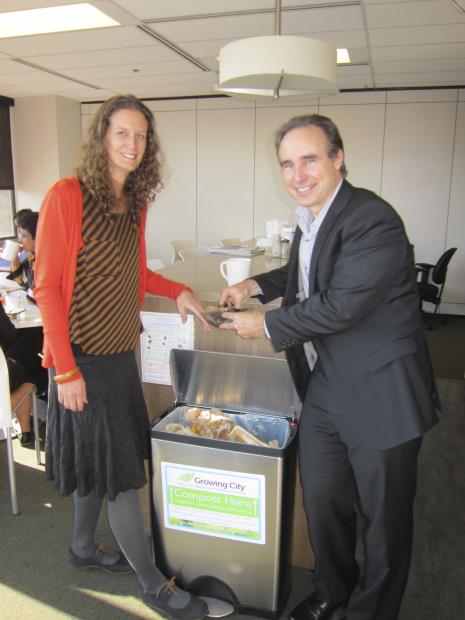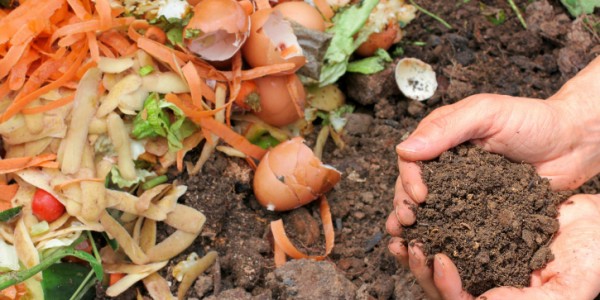4 Reasons to start office composting
Ok, let’s be clear from the beginning. Very few offices will have access to composting on site. If you do and work in a health care office, take a picture and send me a note. Seriously, I’d love to see what you’re doing.

Peter Goldthorpe, vice president, Capital Projects, Real Estate & Facilities and Sonja Janousek, coordinator, Recycling & Renewal Program, support the composting system in the Lower Mainland Facilities offices.
So let’s just assume we’re all talking about “Office Organics Diversion”, which is essentially the collection of food waste plus other compostable items (i.e. paper towels) to be taken offsite for actual composting.
The office where I work (Facilities Management: 500 – 520 W. 6th) has been diverting office organics for 3 years now. We use a small amount of funding from the 5th floor administration and work with a local company that have done a great job servicing the bin.
After three years I have 4 REASONS that Office Organics Diversion is a good idea for most health care offices. Possibly YOURS too.
1. Staff love it. We have roughly 75 staff on our floor and coworkers are constantly telling me how great it is that we were doing this. Though it did take a little “training” for staff to realize that an organics diversion bin was in fact NOT another garbage bin, the staff are all now very well trained to compost food waste, and we have diverted 2 metric tonnes of waste from the landfill over 3 years. We are now so good at diverting food waste that we now need a second bin.
2. It’s mandated. Or it MIGHT be mandated depending on where you work. Here in Vancouver, we have a new bi-law that bans organics from general refuse. We’ve been preparing for this in our Hospital cafeterias / kitchens for a while. But our office space is lagging behind. With hundreds of office sites across the lower mainland, the last time I checked, only 11 had office organics diversion. Ya, that’s sad. I hope more start up soon.
3. It’s good for the Environment. Compost has the ability to regenerate poor soil as it is rich in nutrients. Thus, it can remediate contaminated soil, which we have a surprising amount of. As well, compost will prevent the methane pollution so common with typical landfills. Thus, it’s actually a climate change fighter.
4. We have pilot funding for you! Yes, it’s true. I work in Facilities and we have a small fund from the Lower Mainland Facilities Energy and Environmental Sustainability fund to help offices start an office organics diversion project at their sites for one year. If it goes well, in year two your site will need to take on the cost of the service. Over 90% of the previously funded pilots have made the decision to continue the service at their sites cost.
Learn more
Read about organic diversion across the health authorities here.
Get in touch
If you have some Office Organics Diversion (composting) in place, drop me a note and let me know. I’d love to learn more about it. As well, if you are interested in potential pilot funding to establish a trial organics diversion program at your site, drop me a note.
Contact info: glen.garrick@fraserhealth.ca or greencare@vch.ca
You, too, can help support GreenCare conservation efforts:
To learn more about composting and other GreenCare initiatives, join the GreenCare Community at www.bcgreencare.ca and register on the site, we’ll keep you in the loop as well as give you access to more resources.


Dan Sandberg
HI
I liked the article on office composting. It didn’t mention what you do with your compost when it is soil? Do you have a roof top garden?
I am with a small team…really only 2 on site and rest is in the community all day so composting would not be really advantageous, plus I bring my waste home to the suburbs, and add it to my home compost bucket.
Thanks for the article. I hope it brings more interest in composting.